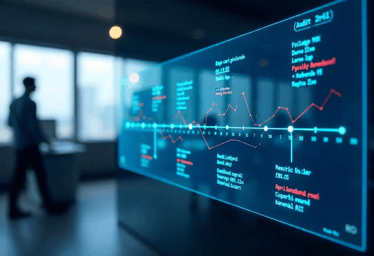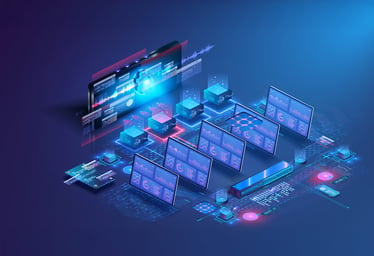Innovation-driven Engineering
Engineered for the Future, Designed for Today
Pioneering AI/ML solutions, cloud engineering, and modern user experiences to transform how enterprises operate, innovate, and grow.
Our Engineering Core Principles
At Ramco, we're guided by these engineering principles that shape how we build and deliver products

AI-Driven Intelligence
We harness the power of Artificial Intelligence and Machine Learning to automate processes, drive insights, and deliver predictive outcomes across the enterprise.

Composable Architecture
Our platforms follow a modular, API-first approach, enabling agile deployment, seamless integration, and scalable innovation—tailored to changing business needs.

DevSecOps Culture
Security is not a checkpoint—it’s continuous. Our DevSecOps model embeds security into every phase of the software lifecycle, enabling safe and rapid delivery.

Cloud-Native & Resilient
Built for the cloud, our systems are elastic, resilient, and self-healing—ensuring high availability, global scalability, and fast disaster recovery.
Featured Articles
From Pixels to Prompts: How a Decade of Design Taught Me That AI Can’t Replace Creativity, Curiosity and Empathy
Let’s be honest — AI is the word of the year. Everywhere you look, it’s the same buzz: “AI is going to take our jobs.

Scalable and Searchable Audit Trail with Elasticsearch: Ramco’s Modernized Approach
In an era where auditability, transparency, and compliance are critical, Ramco is modernizing its systems with a scalable and intelligent audit trail architecture.

Modernizing Bulk Processing
Ramco Applications had the challenge of processing for high volume wherein the processing time was high and had the limitation of processing only one at a time as the entire logic and processing was happening in the database layer.
Generative AI
Reimagining Platform Engineering with Generative AI
Narayana G J P V
Jun 5, 2025
3 min read

Platform Engineering has evolved from a siloed infrastructure-focused function into a strategic enabler of modern software development. Today, with the rise of Generative AI (GenAI), it enters a new era—where automation is not just about pipelines and templates, but about autonomous, intelligent orchestration that transforms both developer experience and delivery velocity.
Why Now?
Enterprise modernization is accelerating, driven by hybrid cloud adoption, legacy-to-modern transformations, and the need for agility at scale. Simultaneously, Generative AI is reshaping how software is written, tested, and deployed—unlocking intelligent automation that complements the foundational capabilities of platform teams.
From our current technology roadmap:
- AI-First Development strategies are embedding GenAI into the SDLC—accelerating design, debugging, and delivery.
- Copilot Agents are being introduced to act as intelligent developer assistants.
- Conversational & Autonomous AI is driving NL-based queries, chat-based self-service, and domain-specific automation agents.
- The convergence of these forces marks a pivotal moment: platform engineering is no longer just about infrastructure abstraction—it’s about experience orchestration powered by AI.
Part 1: Rethinking Platform Engineering for the GenAI Era
Raising the Bar on Platform Engineering
As enterprises embrace AI-first development and pursue modernization at scale, Platform Engineering is being redefined. No longer limited to abstracting infrastructure or maintaining developer tooling, platform engineering is evolving into a GenAI-powered experience platform that dynamically adapts to developer needs.
At the heart of this transformation is the shift from traditional automation to hyper automation—where GenAI brings intelligence, context, and adaptability to every stage of software delivery.
From Automation to Hyperautomation
Traditional platform engineering thrives on predictability:
- Reusable CI/CD pipelines
- Containerized deployment templates
- Observability tooling
- Security baked into "golden paths"
However, this setup often demands significant cognitive effort from developers to understand and apply. GenAI introduces a new paradigm—where platforms become intelligent co-pilots that guide, generate, and even troubleshoot in real time.
What GenAI Unlocks
| Area | Traditional Platform | GenAI-Augmented Platform |
| Documentation | Manually authored, often outdated | LLM-generated, interactive, and always current |
| Onboarding | Static guides and playbooks | Personalized AI-led walkthroughs and task automation |
| Golden Paths | YAML/Helm templates configured manually | Suggested patterns auto-generated from intent |
| CI/CD Pipelines | Event-driven, human-configured | Self-tuning based on history, impact, and code structure |
| Developer Support | Slack tickets, forums | Conversational agents with memory and contextual insight |
With GenAI, developers no longer have to memorize platform intricacies—they converse with the platform, and the platform responds with precision, speed, and safety.
Product Thinking: Developers as Customers
In the GenAI era, platform engineering must adopt a product mindset more rigorously than ever before. Platforms are no longer static utilities—they are dynamic AI-powered systems, continuously evolving based on feedback, behaviour, and emerging patterns.
Key principles that guide this evolution:
- Treat internal developers as primary customers.
- Build for usability, composability, and transparency.
- Continuously adapt based on behavioural telemetry and GenAI insights.
Example: AI-Powered Dev Onboarding
Consider a new developer onboarding to your platform. Instead of reading a long document or attending a walkthrough:
👩💻 “How do I build microservice using our CQRS template?”
🤖 “Here's a ready-to-deploy manifest, CI/CD pipeline, and security config. Should I set it up in your sandbox?”
That’s platform as a conversation, not documentation.
The Rise of the AI-First Platform Team
Platform teams are no longer only builders of tools. In this new era, they become:
- Prompt engineers, designing reusable, composable prompt templates for internal LLM use.
- Feedback miners, analyzing telemetry to discover friction points.
- Experience curators, shaping golden paths powered by GenAI feedback and policy.
AI-First Capabilities for Platform Teams:
- Legacy code migration using prompts
- Auto-summarization of incident trends
- Suggestive linting and policy checks in CI/CD
- Infrastructure code generation and drift detection
- Natural language policy enforcement and alerting
By leveraging GenAI, platform engineers design intelligent defaults that evolve with use—reducing friction and increasing developer flow.
Redefining Value: From Tooling to Co-Creation
The traditional value of platform engineering was measured in terms of:
- Reduced lead time for changes
- Faster onboarding
- Higher compliance
With GenAI, the metrics expand:
- Prompt-to-deploy latency
- Auto-suggest accuracy
- Cognitive load reduction
- Developer sentiment over platform interaction
This shift reflects a deeper transformation—platforms are no longer built just to be used; they are built to evolve with and for the users.
What’s Next
This is just the beginning. In the next articles, we’ll delve into:
🔜 Part 2 – Building the AI-First Platform Engineering Stack
Explore the architecture of a GenAI-augmented IDP—prompt routers, memory graphs, multi-agent orchestration, and more.
🔜 Part 3 – Operationalizing GenAI in Platform Engineering
Learn how to roll out AI-powered platform capabilities responsibly—governance, metrics, risk controls, and team structures that scale.

Narayana G J P V
Vice President – Technology
Driving innovation and digital transformation. With deep expertise in enterprise solutions, he leads strategic technology initiatives across global operations.
Share this article
Shape the Future with Ramco
We're looking for passionate individuals to join our growing team. Explore opportunities that allow you to make an impact and grow your career in a supportive environment.
View All Open Positions



